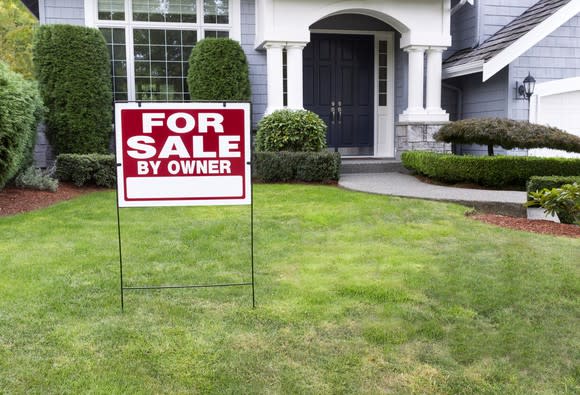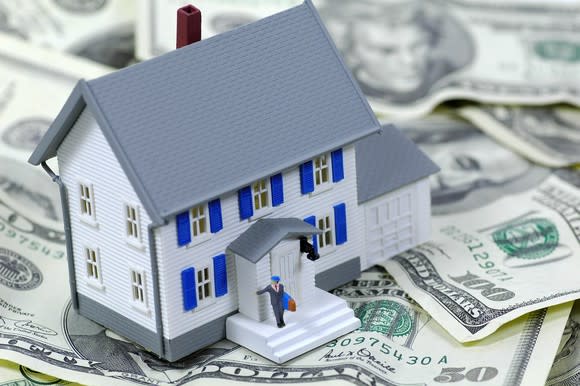13 Things Real Estate Agents Don't Want You to Know
When you buy a home, it's probably the most expensive thing you'll ever buy -- and you're probably not that experienced in the homebuying process. Thus, it's useful to have a real estate agent working for you.
Many prospective homebuyers don't fully know exactly how their relationship with a real estate agent works, and that can lead to misunderstandings that could cost them money. Be sure to enlist and use a real estate agent with your eyes open, and be aware of the 13 things below.

Image source: Getty Images.
No. 1: A real estate agent may not be as good as you think
All real estate agents are not equally skilled or experienced. It's worth spending some time interviewing any agents you might use, asking how long they've been in the business, whether they do it full-time or on the side, how many homes they've sold, what their strengths are, and so on. Be sure they're familiar with the particular town and/or neighborhood where you're planning to buy or sell a home. Ask for references, too, and/or look for reviews about them on real estate and other websites.
No. 2: That commission fee may be negotiable
Whenever a home is sold, commission fees are generally paid to the buyer's and seller's agents. They typically total 6%, with each agent getting 3%. That can seem non-negotiable as it's an industry standard, and any seller you're working with may consider it non-negotiable, too.
But in many cases, agents will negotiate. If the home you're buying is very pricey, for example, they may be willing to shave off a percentage point. (After all, if you buy a $1.5 million home, a 3% commission is a whopping $45,000, and reducing it to 2% still will get them a hefty $30,000.) You also may be able to negotiate a lower fee when you're first signing up with an agent, because an agent who really wants you for a client may be willing to negotiate.
No. 3: They may have a conflict of interest
This is a biggie. If you're looking to buy a home and you sign up with a real estate agent, that agent may not always be serving you in the best way possible because you're not the one paying them. It's always the seller who covers the commission costs of both the buyer's and seller's agents. So your agent may be keeping seller's interests in mind to some degree during the searching and buying process -- and they may be communicating some things about you to the seller's agents.
No. 4: You should use a "buyer's agent" if you're looking to buy
Don't just hire a "listing" agent to help you buy a home. It's generally best to use a "buyer's agent," as he or she will be legally bound to keep your best interests at heart, guiding you through the process and offering advice along the way. Some agents focus exclusively on buyers and don't take on properties to list and sell at all.

Image source: Getty Images.
No. 5: You may be able to buy or sell a home without an agent
You've seen those "For Sale by Owner" signs before, and you may want to park one in your own yard, too. Read up on it first, though, because going it alone can involve a lot more work on your part, and you won't be able to pick the brain of a savvy real estate professional throughout the process, either. You'll also be up against real estate professionals who have much more experience than you do.
Doing your own selling still will have costs, such as perhaps a fee to list your home in the MLS system, but there's a good chance you'll end up with higher net proceeds from the sale, though that's not a sure thing. Selling on your own means you may make some costly errors, too, such as showing the home when it's not looking its best.
Even if you sell your own home, you still may be paying a fee to the buyer's agent unless they're buying on their own, too. If you're buying or selling on your own, it's smart to involve at least a real estate lawyer to go over or prepare documents.
No. 6: Your agent may not want you to buy a lower-priced house
This is another conflict of interest, and it will not be true of every realtor, including yours -- but it could be. Most agents are paid a percentage of the selling price of the home. Given that arrangement with all things being equal, the agent would rather you buy a $300,000 home instead of a $250,000 home because that would deliver a $9,000 payment instead of a $7,500 one at a 3% commission rate. A higher-priced home may actually serve your needs better than a lower-priced one, and your agent may honestly point that out, but remember that the agent stands to benefit if you buy a more costly home.
No. 7: Your agent may be overly optimistic suggesting your selling price
It's often in everyone's best interest for the selling price of a house to be set at a very reasonable level, based on comparable recent sales in the same neighborhood. Some agents will be overly optimistic, though, suggesting a very high selling price. Yes, you might get that price -- but there's a good chance you won't, and if your home lingers unsold for a long time, buyers will lose interest and may even start suspecting that there must be something wrong with the home.
An agent might suggest a too-high price for a variety of reasons, such as honestly wanting you to get as much as possible for your home, wanting a bigger commission for themselves, or perhaps just due to inexperience or bad math. It can be smart to get proposed listing prices from several agents -- which also will give you a chance to meet and interview several professionals possibly to hire. (Keep in mind that some agents may even suggest a too-low price, as that can help the home sell more quickly and require less work.)
No. 8: Don't automatically trust your agent's references or reviews
Yes, this is cynical, and many reviews and references will be genuine. But some agents may be giving out the numbers of friends or relatives who have been coached to say glowing things. And those folks may have been asked to leave positive reviews on various sites, as well.
Do check references or reviews, of course, but perhaps, when possible, ask a few questions, such as how the person found the agent in the first place and how, specifically, the agent impressed them.

Image source: Getty Images.
No. 9: There may be fine print on the contract you sign
When you sign an agreement with an agent to have them represent you, make sure you know exactly what's in the contract. Find out what commission they'll be getting -- whether it's the standard 3% or something higher or lower -- and whether you'll be on the hook for any other payments to them. Sometimes, there may be a charge listed as something like an "administrative fee," and you'll need to find out what that's for. After all, administrative costs are generally included in the standard commission. You may be able to negotiate any other fee away, or at least to shrink it.
No. 10: Some agents have a home inspector in their pockets
If you're buying a home, your agent may arrange for your home inspection to be done by an inspector that he or she knows and recommends. That's convenient, but you may prefer to find your own inspector who's highly recommended by others. One that your agent uses a lot may be reluctant to find gobs of problems because that could stop the sale from going through.
No. 11: An open house might serve your agent more than you
This is good to know, but it won't always be the case. Many homes get sold via open houses, where the buyers drop in and decide they would like to live there. Open houses also can be a chance for other real estate agents to see your home, enabling them to tell their own clients about it if it seems suitable and of likely interest. It's worth knowing, too, that an open house also can serve your agent because when folks come to see the home, your agent can chat with them and get their contact info, hoping to become their agent in their home search.
No. 12: If you sign up with a big-time agent, you might not get their full attention
If you see the same agent's name on gobs of homes for sale all over town and it's clear that they do a lot of business, you naturally might want to enlist them to help you buy or sell a home. After all, they may have been in the business for a long time and be very knowledgeable, with lots of handy contacts among other agents and tradespeople. But be careful.
If they're as busy as they seem to be, you may not get their full attention. They may have someone else at their company doing some or much of the legwork. It can be good to clarify upfront just how much of the work the star will be doing and how much will be delegated to others.
No. 13: Maybe you shouldn't buy a home -- or sell yours
Since agents get paid for selling your home or helping you buy one, they won't be eager to tell you that maybe you shouldn't buy or sell a home right now. So be sure to consider that carefully on your own.
For example, if you're not going to be in a home very long, it might not be worth buying it and paying closing costs and lots of mortgage interest when you could just rent. Similarly, if your financial situation is a bit shaky, you might not want to sign up for mandatory monthly mortgage payments that also are often accompanied by various repair and maintenance costs. Meanwhile, if the current real estate market is greatly favoring buyers and there's a glut of properties on the market, you may not get a good price for your home. If you have the flexibility to stay put, that might be your best move.
Here's what your agent does want you to know
After a bunch of points that might seem like real estate agent bashing, here's a last point that's also rather good to know: Yes, while agents sometimes collect big fees for what can seem like little work, they generally do considerable work to earn their commissions. Remember that they may take some clients to see dozens of homes before one is bought.
They may also do a lot of behind-the-scenes work, such as contacting fellow agents to find out about available properties or to pitch your property. Agents also may have to pay to access the MLS database and have regular fees to pay to keep up their various memberships and credentials.
If an agent has been in the business for many years, they'll be sharing a lot of what they know with you, explaining about attractive or worrisome aspects of any given home, guiding buyers to the most suitable neighborhoods, and advising on what the best price should be when you want to list your home or make an offer on one. Oh, and bear in mind that they'll typically be sharing the commission with their brokerage firm.
Many agents end up keeping far less than 3% for themselves. They're also facing a lot of competition, as there are many agents out there vying for more business. Some make a good living, but others are struggling.
Enter the homebuying or home-selling process with your eyes open about agents, but be aware of how helpful good ones can be. Indeed, many realtors will offset the cost of their fees by helping you get a better price or by steering you away from costly mistakes.
More From The Motley Fool
The Motley Fool has a disclosure policy.

 Yahoo Finance
Yahoo Finance 